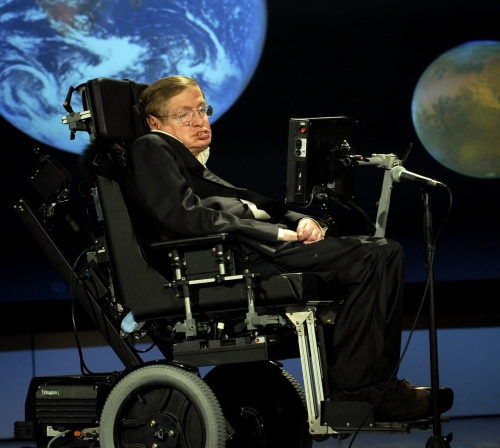Often, the presence of death turns us to questions. Almost as if on their own, our minds grab for answers we hope will lead us to understand. We each phrase the questions in our own way, but the aim is always to try to find meaning in—or at least make sense of—what has just come to pass. Not just “Why did this happen to me, to us?” but “What is death, anyway?”; “What is the point of life if we’re just going to die?”; or “What happens to my loved ones when they pass on?” In whatever way we phrase them, these are some of the same kinds of questions philosophy has asked for centuries, but has so far never answered. For people such as Stephen Hawking, though, these thoughts, if he had them at all, were merely residue from a more superstitious age.
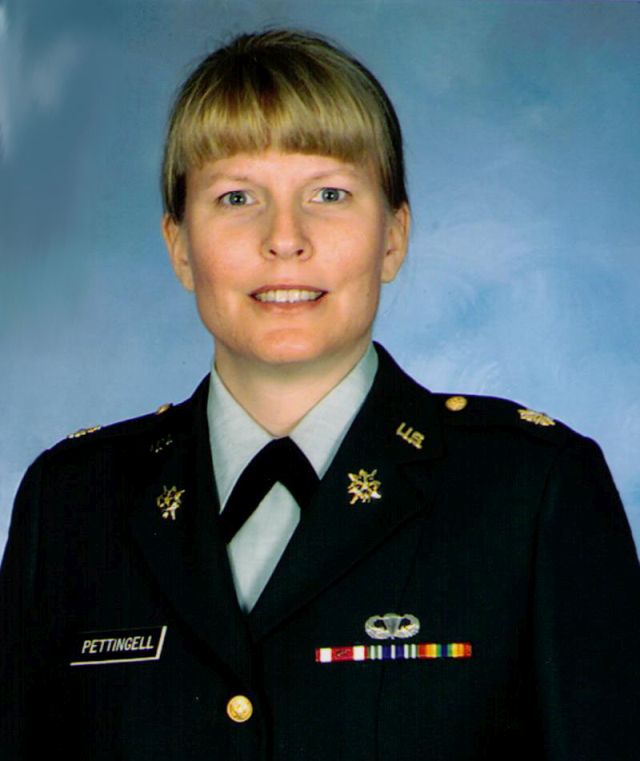
But I am not Stephen Hawking, and just before the June 2002 remote viewing conference, those questions suddenly became mine as I tried to come to terms with the sudden and tragic loss of my close friend, remote viewer Gabrielle Pettingell. Shortly after dropping off her daughter at Girl Scout camp, Gabi was killed in a car crash on I-75, south Florida’s “Alligator Alley.” You don’t expect people to die when they’re minding their own business; if anyone is going to die you expect it to happen when they’re drinking and driving, playing Russian roulette with illegal drugs, or base jumping from a skyscraper. In those cases, there might be sadness—but there is also a kind of logic to it. The deceased, after all, had a say in it—had gotten there at least partially by choices, whether foolish or simply reckless.
But somehow, it seems that lovingly going about family duties ought to buy you a pass, a kind of immunity from blind, senseless death. Unfortunately, the world doesn’t always work that way. When Gabi’s husband Garrett called with the news, it felt as if the universe had suddenly come unstitched at one of its corners, spewing a torrent of meaninglessness from its core.

Thankfully, that sudden, sinking, hollow feeling was absent from my life for nearly a decade. Then, eight years later in September, my father-in-law Bill Gibson literally dropped dead in an instant as he and his daughter, my wife, fitted clean sheets to his bed. It was the 65th anniversary of his final World War II mission, flying the Japanese surrender photos back to the United States in a B-29. Ninety years old, in good health, a survivor of two Pacific Theater combat tours and one in Vietnam, it seemed a quirky, yet gentle way for him to go, just making a bed. But the unexpectedness of it brought back the flood of questions.
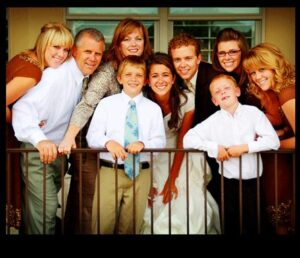
Then, barely a week later a family friend, Rod Dial, father of six, volunteer builder of Mexican orphanages, successful entrepreneur, and mentor to dozens of young men needing direction in their lives, died in a freak kayaking accident within hours of his elderly mother’s passing. Attendance at his funeral numbered one and a half thousand souls, filling the chapel to the gills; the service was streamed on the Internet.
A few years before, Rod and his wife had been called by the FBI. Their old family Suburban, sold to buy a new car, had found its way to Iraq, been loaded with explosives, and detonated in a crowd of people. The Dials found it a sobering moment, to learn that the vehicle that had carried them and their children on many enjoyable vacations had become the vehicle for sending a score and more of souls on to their own unforeseen encounter with the afterlife.

I came cheek to cheek yet again with death as we buried my mother the day after Mother’s Day in 2011. A peal of thunder, rare in the dry deserts of southern Nevada where we laid her to rest, and a low, slow flyover by a lone Cessna, waggling its wings as it droned by overhead—both presumably happenstance—came fortuitously at the precise moment of her interment.
With Mom, though, it was different. By the time she was moved into hospice, no surprise was left, just a vague expectant sadness that gave me time to reflect and mourn in advance an inevitable outcome. One can get a little used to death, especially if it drags out its arrival, or if it visits often. But at unexpected moments, the freshness of my mother’s passing wells up—often sparked when a random question pops into my head that she could easily have answered. “I’ll have to call Mom and ask…” I begin. But the thought trails off into mental echoes when I realize there will be no more calling or asking. And again I return to thinking about death and life and life after death.
Just eight days after returning from my mom’s funeral, my ex-wife phoned with word that John McCaughan, who was once my brother in law and has always been my friend passed away from brain cancer. It was John’s wife Virginia who took me under her wing when I was first recruited into the military remote viewing program. Because it was secret, I couldn’t tell her then what I was involved in. But I did seek her advice in what esoteric sorts of books to explore back before I knew anything at all about “paranormal” subjects.
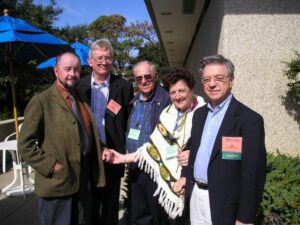
John himself wasn’t so much interested in the paranormal—but he did teach me how to bowl (even if I was never anywhere near as good at it as he). He was, though, very much a believer in spiritual things. A quarter of a century before, he had nearly died of a virulent form of malaria picked up while serving on a Navy salvage ship clearing the Suez canal after the Yom Kippur War. Though eventually healed, a major heart attack a few years after revealed that his heart was irreparably damaged by the malaria treatments. Against considerable odds he underwent a successful transplant. His new heart stayed strong for the rest of his life—was still functioning normally twenty years later when the rest of him finally gave out. John used that time to good advantage, lecturing in hospital settings and in social work classes at Catholic University on the transplant experience, and about the three near-death experiences he had as he teetered on the far edge of life more than two decades before.
John’s death played counterpoint in a delicious irony that I found out about immediately afterward. Two days before John’s passing, while he still hovered on the cusp between mortality and the hereafter, the brilliant cosmologist Stephen Hawking gave an interview to the British newspaper The Guardian. Hawking, famous for his justly-acclaimed A Brief History of Time, had recently published a new book, The Grand Design. In the book, he argued that, according to what we think we know from the theories of relativity and quantum physics, the existence of a God is not necessary for the Universe to exist. And, following from Occam’s Razor, if something isn’t necessary and there is no other (scientific) evidence for it, then we have no reason to suppose it does exist.
In the Guardian interview Hawking went even farther than he did in his book. When asked whether given his serious health problems he ever feared death, he replied that the idea of an afterlife is a “fairy story for people afraid of the dark.” He said he compared the brain to a computer which simply shuts down when its parts finally break. “There is no heaven or afterlife for broken down computers,” so there is none for us, Hawking was sure.
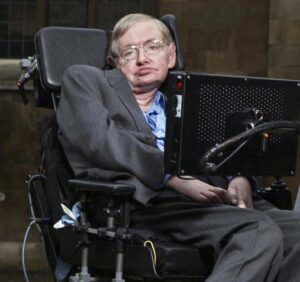
In his opinions, Stephen Hawking only echoed the beliefs of many people today, whether or not they be scientists. For them, the evidence not only of their eyes but also from the instruments of science is conclusive. Their bodies go away, come apart, with the basic elements that once made them up leaching away. Eventually there is nothing left save, perhaps, a few fragments of bone. In enough time even those disappear. What more evidence would you need that everything ends with death ?
For Hawking and those past and present who agree with him, belief in an afterlife is a coward’s choice. People only continue stubbornly to believe in life after death out of terror that their lives will finally, utterly end—that they can’t bear the thought that not just their bodies, but their personalities and consciousness will just instantly cease with their final breaths.
I have certain religious beliefs about what happens when one passes from this mortal world, but I won’t bother you with those here. The fact is, there are lots of different beliefs about life after death, and despite the ostensible scientific evidence to the contrary these still persist. There are those that (to speak in stereotypes) imagine heavenly choirs playing golden harps—unless you are among the condemned who burn instead in fiery cauldrons. There are some who are convinced that a blessed few will live in paradisaical bliss while the rest of humanity slumbers forever in mindless nothingness. Still others are persuaded they will spend the eternities praising God. Others believe that we have recurrent lives here on Earth, each life a hopeful step in progression towards a seamless Nirvana where self ends and completeness reigns. And there are many shades in between.
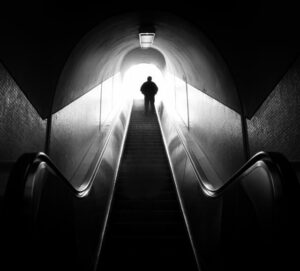
All of these have equal weight to those who don’t believe in them—which is to say no weight at all, since each requires its believers to entertain certain propositions for which there is no objective evidence. A Catholic, a Protestant, a Buddhist, a Moslem, or even a Mormon like me accepts the premise that there is a continuation of some aspect of mind or soul or spirit even beyond the grave. Yet when challenged, none of us can point to anything that proves our view is correct. There’s no help for it—our beliefs, though heartfelt, are evidence to no else but ourselves.
The only consolation, it seems, is that a doubter (“atheist” is a vaguely uninviting word, so with a couple of exceptions below I will use “doubter” instead) such as Hawking is in no better straits when it comes to his side of the argument on whether some element of ourselves survives beyond the physical body. Doubters are sure there is no life for any of us after we die—but they, like us, can’t really prove it either. A doubter merely accepts the contrary premise that there is no such continuation of anything beyond the body. “After all,” they will say, “no one has ever come back!” But that is no evidence at all against life after death.
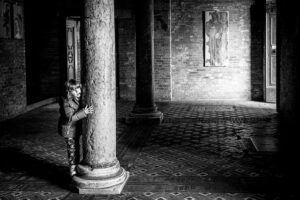
For them this lack of definiteness poses no problem. According to their application of Occam there is no need to consider the possibility that souls exist when quantum physics can cover anything that needs explaining. The questions believers ask, the answers they seek, the meaning or understanding or sense-making they long for when confronted by death are no more than being “afraid of the dark.”
But are the doubters right? If they are, why is the belief in an afterlife so hard to stamp out, even in the absence of any physical evidence for it? Why do cultures from the most primitive to today’s modern world still harbor robust beliefs (no matter how they differ one from another) that life and awareness go on in some form, even after physical death?
There are, to be sure, the persistent stories of near-death experiences that have been reported for centuries. Or the many reports of visits or communications from departed souls. Or appearances by angelic beings. Won’t those count as evidence in favor of an afterlife?
Of course they count as evidence—of a sort. But this evidence is neither conclusive nor even very persuasive for those who don’t already believe. These are subjective or anecdotal experiences—that is, not reproducible, only reportable. Scientists can (and do) offer their own theories in rebuttal: If such experiences don’t come from outright fraud or mental illness, then they arise from purely psychological origins.
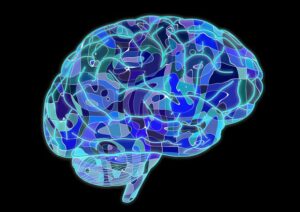
A whole new research approach, loosely called “neurotheology” explores the point where spiritual experience and brain science come together. Researchers think they have found brain sections that switch on when a person enters a spiritual or otherworldly state. In other experiments, actively stimulating various brain centers produces feeling of coming partially out of one’s body, entering a mystical state, or merging into a transcendent experience. Scientists conclude that mystical or spiritual experiences are “real.” They just don’t have any relevant connection to anything outside our brains. Religion is the result of a brain hiccup.
Another angle on the question comes from the life sciences. Some evolutionary biologists promote the idea that religious experience—including belief in a hereafter—together with mystical states and behaviors that go with it—may well be adaptive. Evolution has designed humans to have these experiences as a way of enhancing important human group survival traits, such as loyalty to spouse, altruism, or group cohesion.
Hawking, it thus seems, must have been wrong—just not for the expected reason. Of course there is no afterlife; but the need to believe in an afterlife is not fear-based after all (or at least not completely). Instead, it is an actual, physically-grounded human trait, programmed into our psychology by evolution. This argument is offered, in a way, as if expecting us to take consolation in knowing we come by our mistaken beliefs in an afterlife fair and square.
But be honest. Do you really find this explanation satisfying—does it help you in any way? I confess, it does nothing for me. If anything, it feels worse to be constrained to believe something that I know now to be a fiction (even if that constraint is by force of Nature). (One of the more annoying things about living in a fully deterministic world would be to realize that everything we believed would have been previously programmed into us by conditions completely beyond our control.) To be sure, a sense of dissatisfaction or discomfort is scarcely proof that something is not true. Yet the thought lingers—do I really “know” by the findings of scientists that what I believe about the afterlife is a fiction? Just for starters, I could ask one (perhaps rhetorical) question—“If we accept that belief in religion and the afterlife is a biologically programmed fact, how can such things as atheists possibly exist?”
There are better ways to respond to the claims of those who bet against life after death. I offer evidence of the non-local mind. If it could be shown that some aspect of individual consciousness transcends the limitations of the physical human brain, that would give us reason to suspect the case is not as closed against there being an afterlife as doubters might hope.
After all, for some element of our consciousness to survive death, consciousness itself would first have to be capable of existing independently of the brain. (Brains die and rot away; an individual’s consciousness would have to continue on if it were to survive death.) But how would we ever know that, without actually dying? Here’s an idea: If, while we were yet alive, we could find that some aspect of consciousness extended beyond our bodies, that might be plausible evidence for an independent consciousness capable of surviving death.
What consciousness researchers such as Russell Targ, Stephan Schwartz and others have taken to calling “non-local mind”—a term coined by Dr. Larry Dossey in his 1988 book Recovering the Soul—fits the bill for just such evidence.
If it is real, then we might not be surprised if “non-local” mind or consciousness could influence and be influenced by other minds, distant aspects of the universe, or even different moments in time—past, present, or future—without physically-associated connections in between. Separation, distance, and duration should have no necessary limiting effect on non-local consciousness.
Remote viewing (or more accurately, “remote perception”) is one source of evidence for non-local minds. Using the faculties of their minds alone, remote viewers obtain perceptions from locations, people, or events thousands of miles distant from them; they collect perceptions from within sealed containers and rooms; and they do this in present, past, and (sometimes even) future time frames. What could be more “non-local” than this?

I am most experienced with remote viewing. But there are other manifestations of non-local consciousness as well, which parapsychologists have carefully researched, yielding confirming results from a large number of human subjects. All of these constitute one form or another of extra-sensory perception, or “ESP,” which could only work successfully if some aspect of our minds is indeed unconstrained by the limits of our physical brains.
There is not space here to describe and present the case for this research (it took seven chapters in my Ph.D. dissertation to catalog, detail, and defend the findings in just four of these research paradigms), but the material is available to anyone interested in getting into it more thoroughly.
Most people have not heard of this evidence. Successful parapsychology results rarely get written up in the newspapers or on syndicated news websites. Results are published mostly in specialty peer-reviewed journals, and rarely make it into the mainstream scientific literature, thanks to the great influence wielded by the community of doubters. But the mere existence of this body of research is powerful evidence that our minds—our consciousnesses—can extend beyond our physical boundaries. This in turn says that scientists like Stephen Hawking need not be taken too seriously when they declare that belief in an afterlife is only for people who are either weak in the mind or weak in the knees.
Please don’t mistake me. I’m not by any means arguing that this counts as absolute proof for life after death. It is still possible (though I think highly unlikely) that we will one day discover these phenomena to be necessarily tied to physically-living systems. But what it does do is pry open the door that doubters have tried to slam shut based on their own inconclusive evidence, thus restoring the debate to a more even playing field. Doubters have had the argument their way for a long time. The evidence of non-local mind says the case is far from closed and those who believe that there is life beyond death are not as irrational as those who emphatically disbelieve in an afterlife claim.
When writing about Gabi’s passing in my book Reading the Enemy’s Mind, I included the following words:
If Gabi and I learned anything from the remarkable experiences we shared during four years together at Fort Meade and another 12 beyond…it was that Bob Monroe was right: We humans truly are more than our physical bodies. Remote viewing and the other psi phenomena show that consciousness transcends the boundaries of space and time, giving plenty of reason to think that, whatever form our self-awareness may take, death is no end for us. (P. 473)
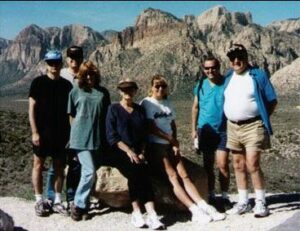
Skeptical scientists often complain that all parapsychologists want to do is prove the existence of the human soul. Laying aside the fact that many parapsychologists actually don’t really care about that question, for those that do there is a perfect response available: “OK, but so what?”
Physicalists–scientists and others who believe that there is nothing in the universe but physical things (doubters are by and large physicalists)—have been trying for a century or more to prove the soul doesn’t exist. Stephen Hawking and uber-doubter Richard Dawkins (one of atheism’s most zealous evangelists) are just among the latest examples. Why should they get a pass for their unprovable agenda when parapsychologists are denied a pass for theirs?
As for me, I think the evidence is strong enough. I look forward to a happy reunion with my mother, in whatever form that is when next we meet—and along with her, Gabi, John, Bill, and Rod (and all those who between then and now will have also transitioned to the other side).
In life, people who are “afraid of the dark” find that, even after the light is gone, they are still there, awake and aware (if maybe still a little afraid). So I fully expect to shake hands, whether literally or figuratively, with Stephen Hawking as well. I will greet him cordially, and will be pleased—as I hope he too will be—that we finally have the chance to get to know each other personally. I’m sure it will make for a lively discussion.
